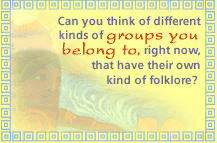 |
|
 |
 Folklore
can be found all around
us. "Folk
is defined as "any group of people
whatsoever who share a least one common factor" (Alan Dundes).
Every person, at a given time in his or her life, is part of not
one, but many groups around us. The three categories below define
places and groups where you can look for different types of folklore. Folklore
can be found all around
us. "Folk
is defined as "any group of people
whatsoever who share a least one common factor" (Alan Dundes).
Every person, at a given time in his or her life, is part of not
one, but many groups around us. The three categories below define
places and groups where you can look for different types of folklore.
 Children Lore:
Children Lore:
When you learn "step on a crack, break
you mother's back" from a friend in school or tell ghost stories
around a campfire, you are learning and passing on your own kind
of folklore, children's lore. Games children play in a neighborhood
playground, like hide-and-seek, hopscotch, jump-rope chants; marbles,
baseball signals, or deciding who is "it" for freeze tag by "counting-out"
— all of these are part of children's lore, which exists all
over the world.
 Family Lore:
Family Lore:
Many families have their own stories,
which are passed down from grandparents to children and grandchildren.
These stories might have to do with how the families came to live
in the United States or other parts of the world. Some families
like to remember a certain relative, by telling stories about him
or her. Other times, families have special ways of cooking, singing
lullabies, or games they play at birthdays, holidays, or even traveling
on vacation. How you were named, how you celebrate your birthday;
stories about your grandparents, aunts and uncles, cousins, and
relatives that are passed on and remembered, all these are part
of your own heritage, your own family folklore. Collecting family
stories is one of many ways to learn and record folklore. Your family
folklore also includes shared wisdom, like sayings and proverbs
or material things like jewelry, home decorations and recipes to
list just a few.
 Community Lore:
Community Lore:
Wherever you live, whether it is in
a city, a town, suburbs, or on a farm, you will have many opportunities
to discover folklore heritage and expressions. How does your community
celebrate holidays like the Fourth of July, Halloween, or Thanksgiving?
Are there parades? Special food, songs or clothing? If your family
came to the United States recently, or even generations ago, you
could be celebrating other important holidays with neighbors and
friends, like Chinese New Year, the Day of the Dead, Kwanzaa, Three
Kings Day, Passover, or Corn Dance, a Native American ceremony from
the Southwest.
Sometimes, celebrations are about the
work people do. In Maine, every summer, there are community celebrations
called Lobster Fests. Fishermen line up their lobster crates on
the water — tied one to the other by ropes — from the
shore to the edge of a dock. Players have to balance themselves
and run from one crate to the next without falling over! Whoever
gets to the dock first, wins! Of course, food, music, and dancing
are also part of the day. In folklore research it's important to
ask questions: How did this event get started? How long has it been
going on? Are there lobstermen who have special stories to tell
about being out on the water, one season after the next? Finding
community events that celebrate work and local history are also
part of folklore research.
On some city streets, grownups will
sit outside on a summer's day and play board games like dominoes;
or active games like bocci — a game from Italy where players
roll a ball and knock down pins — like bowling. In some neighborhoods,
storeowners include artwork, lettering, statues, or other decorations
that show not only what they are selling, but also who they are,
and where they come from. All of these "count"as examples of folklore
outside of your home and family. We'd love to hear about them; and
invite you to write us your family or neighborhood stories.
Here are some examples of folklore
and family stories from relatives, friends and people I work with.
As you read them, think of questions you might ask your parents,
grandparents, relatives, and friends about family or neighborhood
lore that is special to them. To view the examples, click on a link
below.
Proverbs
and Traditional Wisdom


Lullabies


Finger
Plays and Songs


Folklore
From a Friend



A
Holiday Tradition



A
Childhood Memory


Above
material courtesy of Bank Street College Folklore and Storytelling
Archives
|
 |
 |